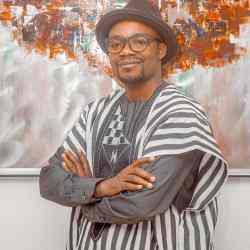Introduction
Roberto's vision is to harmonize the relationships within the working environment. Everyone feels co-responsible and co-owner. He brings to society a harmonious model of cooperation that empowers workers and replaces the potential conflict model of traditional companies. He is changing dependent employees into a well-trained group of company co-owners and is doing that in harmony with the CEO and managers. In that vein he is transforming one company into a consortium of diverse entities, like cooperatives and regular business companies. Along these lines he is empowering employees to increase theirself-reliance and is enhancing their managerial and technical competences.
The New Idea
Roberto is harmonizing the working environment through delegating co-partnership and co-responsibility to employees. He is doing this by introducing diverse portfolios and types of organizations, specially cooperatives and building a synergic model between them. Roberto prevents and solves employers - employees conflicts through empowering employees to become real partners and allies of the existing executives. He is doing that in harmony, so that both parts are benefiting through a win-win strategy.
Roberto proposes a methodology that transforms businesses into networks of alliances. Employees are going through an empowering process,which augments their self-reliance and competences. At the end they become reliable, cooperative and productive partners of the owners and CEOs. Hence, they are fully prepared for becoming owners of their own cooperative which, in partnership with the old company structure and their executives transform into a consortium of diverse companies. It provides them tools to help them find "their place in the world". Roberto also works with owners, CEOs and managerial staff in order so that they can understand and become a part of this new structure and relationship model. Hence, both workers and employers are agents of change and as a collective are able to understand that their first objective is to serve the society in which they are inserted, where, besides economic value, social value is also generated. Moreover, this transformation makes the consortium more nimble and competitive in the market.
The Problem
Venezuela is characterized as a country with high entrepreneurship; however, legal, social and political conditions, in addition to very slim opportunities, along with a demobilization and exponential deterioration of the production and business sector since 2002, as well as interventional policies carried out by the Government contrary to entrepreneurship, has led to conflicts between employees and employers. The Government has intervened 1440 companies, most of them have been expropriated for the government and given by it to labor unions creating a fight between the employers and employees. 80% of the expropriated companies have ended in looting, bankruptcy and a dramatic deterioration of the economic-social system, to a point that all this has led to alarming impoverishment, deterioration of working conditions, increased unemployment, the emergence of informal employment and a significant reduction in the number of companies in the country.
The current conditions have led to a profound shortage of food, medicine, materials, supplies, leading the country into all levels of poverty, and the appearance of mafias, such as "bachaqueros" who buy and then resell products in the "black market" to consumers who find "nothing" in the market, at prices that are sometimes 1000 fold of the price regulated by the government. The minimum daily wage is not enough to pay for food for one day, so the poverty line now covers the vast majority of the population.
Work legislation has an expansive power and has ended covering almost any way of work organization. The language and logic of social and participative economy is radically different to the corporate one; it is important to develop both employers and employees ability to understand and cooperate with each other for their mutual benefit. Companies end up losing their horizon for planning, and given the uncertainty, the only prudent thing for them to do is to keep labor costs low. The consequences are low incentives to launch enterprises, difficulties to retain talent in the organizations and, in short, an adverse framework for the development of productive companies.
The Strategy
Roberto inherited from his family a deep concern for social issues and whilst studying sociology he was shocked by the contradictions between sociology and business. His first idea came into action in 1997, when he started to work in Venequip as a consultant with the task to transform the company and to solve the conflict between the employees represented by the Labor Union and the employers represented by the CEO and managers. His idea transformed the company into diverse entities like cooperatives and regular businesses by empowering the employees to become real partners of the productive process. His core conviction was that the real harmony and successful cooperation comes along with empowering employees so that they become loyal, committed and productive partners and, in that way, removing the usual luring conflicts. He decided to use the successful Venequip transformation model to help also other companies and their employees.
Roberto changes the mindset of the workers and sub-employees, who usually havemenial jobs, temporary or seasonal, who are poor people with no opportunities to become contractors, so they can organize themselves as a cooperative and thus become owners of their own businesses. To do that he designed 3 stages:the first stage is “from me to us” and involves the transformation of competition (individualistic thinking) to cooperation (collective thinking). The second stage is to bring workers to articulate their dreams and vision into a down to earth, achievable objective and the third one isto develop a shared vision in which the company and the organized workers manage to make lasting and mutually beneficial agreements.
In 2001, Roberto was appointed director of Venequipin order to transform labor relations in alliances with cooperatives and he went to study The Mondragon experiences in Spain, with a scholarship granted by Venequip. He redefined his methodology, concluding that workers can be their own bosses, which means that they can become aware of their need to develop their skills related to Self-Government, Self-administration and Self-Discipline. He developed a five month program, with 3 new stages: training in business competences, establishment of a new organization and negotiation skills. At the end of this five month program the workers have established a new form of association and as such, presents its service offer to their former employers. This step is critical because, at that moment, the initiative is invested and is the workers, in the exercise of their constitutional rights, who act and take charge of their destiny, as co-owners of their enterprise. This act, which summarizes four or five months of work, is at the center of the shield against the harassment from public auditentities with more ideological bias. The answer to state intervention against the company, allegedly acting in defense of workers, is to turn workers into entrepreneurs. This is an innovative idea, because up to the present moment in Venezuela, subject to a political polarization in all walks of life, the defense of workers of their own destiny is paramount in preserving jobs and open industries. As was mentioned before, the government expropriates industries and gives them to their workers without any training in managerial skills.
In 2007, Roberto decided to create The Organizations Laboratory (LABOR), a civil association where employees are partners and share in the fees generated, in proportion to their contribution to each project and to the spread of his ideas. In 2011, Roberto took the step to provide cooperative training courses in a more entrepreneurial format, including pro bono work. Since then, Roberto affects the empowerment of associative groups of workers for entrepreneurship and even adds to LABOR the cooperators so as to inspire newcomers to the idea from their own experiences. Roberto decides to place the employees the center of his entrepreneurship and also focuses on creating partnerships between organized communities and businesses. Through the years this has led him to build a network of companies and cooperatives that are examples of the success of his approach.
Between 2007 / 2015 Roberto transforms 50 companies and 1020 Cooperatives conceived from the organization of former workers of these companies, reaching over 15,000 workers. Several of these cases have been subject of case studies at the IESA (a highly prestigious business academic institution) and as thesis both at the School of Social Sciences in the UCAB (the Catholic University of Caracas) as well as a Master’s degree at the IESA with which he continues to maintain relations. These case studies and research shows shows how the members of the cooperatives, as is the case of Inversiones Animese, have raised their level of education and income as well as living standards for their families due to the organization into cooperatives instead of been an employee of a larger firm.
Roberto creates different models of cooperatives, more flexible and competitive in the present market conditions. He sets as an example the situation of truck cargo loaders and unloaders of the industrial zone II of Barquisimeto, whom he helped to organize into cooperatives providing different services. These people told him "We were marginal and now we are a company specialized in handling cargo for corporations". Truck cargo loaders and unloaders are along the industrial areas of the country; they are very poor, often barefoot and in precarious conditions; they provide the service of loading or unloading trucks for tips, without a wage or fixed salary. Their consolidation into a formal cooperative has increased their self esteem, level of income and has strengthened the social ties between owners of industries and the –usually- very low income communities that surround the facilities.
Roberto has consolidated an association with graduates of his own programs who are now part of his project as facilitators and providers of the services rendered by Laboratorio de Organizaciones. Labor. The models of partnership have diversified and his working methodology has consolidated, through the incorporation of the outcomes of each experience to their own learning as entrepreneurs. This is Roberto’s dream of being able to transform the very nature of work relationships and its social significance, not only within the limits of Venezuela, but also regionally. There are some groups associated with Labor and very often he is doing pro-bono work with the menial workers to empower them.
By 2016 he has 9 competent companies with the system implemented and functioning. This shows that the methodology has expanded in Venezuela. For 2018 Roberto plans the construction of a headquarters building for the training of promoters and facilitators, who are multipliers of his methodology; this, complemented with case studies publications that account for the success of his methodology management, the creation of knowledge and experience, virtual and face-to-face networks that enable to share among community members different and creative solutions that these partnerships have brought to businesses and communities, are the means by which he is already replicating his idea.
He plans to launch a platform in order to create a movement and stop being a one man’s idea by 2020. Also he plans to influence the law. By 2026 he plans to impact at least 10% of the workers in Venezuela and thousands in the continent, thereby multiplying the number of agents of change capable of bringing this model to more companies and communities, increasing the areas designed to provide this type of training, and multiplying the message, carry the news of a new work concept and business to every corner of the globe.
The Person
Roberto grew up in a family that for generations has struggled to bring health, education and democratic institutions into the twentieth century. His family has conveyed him the commitment to fight against poverty and dedicated to the purpose of building a nation. His mother, born of Italian immigrants, and fatherless at an early age, teaches him the value of work but it is his grandmother, from whom he learns the entrepreneurial spirit: she managed to successfully raise a large family among the toughest adversities, and never ceased to undertake until the last day of her life.
Roberto studied sociology, and in 1986, the day after his last exam, with only 23 years of age he had to take over his grandmother’s business, as she was over eighty years old and was still managing the company. That's when he faced the challenge of running a business; from his grandmother hand he experienced the difficulties and rewards of entrepreneurship. He then founded his own companies, sells his shares of the companies he founded and traveled to Boston with the purpose of learning English and to learn about the business world in the USA. He returned to Barquisimeto, to hisgrandmother’sbusinesses, providing vision and his new skills. After drawing away from the family businesses, coffee production was his source of living until he had the opportunity to advise organizations in their business schemes.This is how in 1997 he started working as a business consultant. He was hired by Venequip, a representation of Caterpillar in Venezuela, as Director of the company, which after solving the company’s conflicts gave him a grant/scholarship to carry out studies about the subject in Spain, where he obtained his Master's Degree in Government and Culture of Organizations at the InstituteofBusinessand Humanism of the University of Navarra, where he developed the program of courses that would allow moving from a concrete experience to a methodology for the transformation of companies into networks of alliances with workers.




